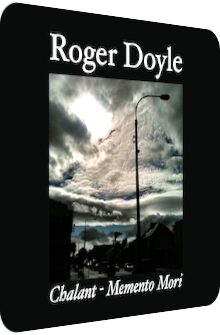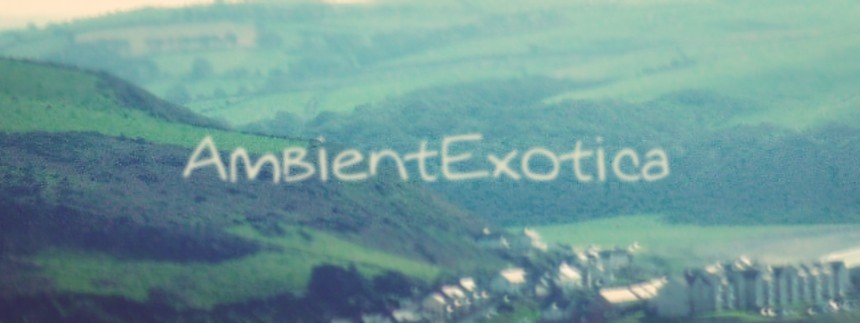
Roger Doyle
Chalant – Memento Mori
2012
Irish composer Roger Doyle is known for his interweaving of classical, piano-driven structures with Ambient synth strings. In his long career, he came up with several pieces for theater performances and films. The following sentence you're about to read is a common one, but its truth cannot be stressed enough, for it builds the nucleus of his latest work: Chalant – Memento Mori is his most personal record ever. Yep, this sentence is a cliché and comes up in every other review or interview, regardless of the artist or the genre. But it is oh so true here. The almost 80-minute long album presents various answering machine messages of Doyle's family, close friends and partners, all of them recorded and preserved in the late 80's. Nostalgia is thus a huge and always perceptible element in Doyle's music, especially since a lot has changed in the decades that passed by. Faithful companions died, grave issues were discussed, but also new life was born, adding waves of excitement and perfect happiness to the emotional cocktail. What was a concern or pesky annoyance back then is now transformed into melodious memories, making the emotion of delight an equally important counterpoint to nostalgia. It is hence impossible to remove Doyle's memories from the music. It is also hard for the listener to grasp the scope of the memories in their entirety. But the concept of melancholy works regardless, and the gorgeous interplay between acoustic sections and piano melodies with swirling synthesizer backings is heart-warming at worst and overwhelming in Doyle's best moments. Be aware that the album fits predominantly in the Modern Classical genre – the synth-driven ambience is only a secondary ingredient. Or is it? There are huge surprises included which weren‘t expected by me. If Doyle‘s focus or the surprises don't turn you off – and I really hope they don‘t, for you would be missing a deeply meaningful release –, you will experience a curiously varied album. I don't know much about Roger Doyle's private life, but I still enjoy the overall concept and the various breaks in style he integrates at certain points. Just a hint: the above genre categorization is just a helpless description and doesn't lead to enlightening conclusions. I will exemplify below why this is the case.
Chalant: Parts 1–3 starts the album with a tense melody on a punchy, highly placid acoustic guitar, followed by tremendously soothing, sustained synth pads. Their multiple textures oscillate between brightness and darker undertones. An answering machine message is interwoven, but it is barely comprehensible. It probably isn't meant to be comprehensible, but functions as a limewashed, mood-enhancing device rather than an artifact of the past that transports an important meaning. Since the person on the phone is laughing, the message is probably inducing pleasant memories. The following parts change the mood completely, presenting dominant bass guitar pluckings with cherubic background strings that grow gradually louder and fade out at the end of the track. Voice Of Parents is less of an enigma. It starts with slow, warm piano chords and accompanying synth strings which are tremendously lush. The song consists of the incessant upswell and downfall of the strings, it oscillates between moments of quiescence and vibrantly colorful bursts. A call of Doyle's mother is embedded, and after the end of the recording, the strings swell in volume again, amplifying the melancholy but also the power of their beauty. Even though the presentation is purposefully minimal, the result is very strong and filled with warmth and coziness. And yet there's that glint of heaviness perceptible that is so typical for melancholia. The following Back In Time, though, is a pristine, crystalline Ambient song that consists solely of beautifully swirling synth washes and various messages by Paavo Evans-Doyle, spoken in 1989. The synths are coruscating and the aura depicts a care-free stream of memories that is encapsulated in this setting. A gorgeous track and a wise choice for Ambient fans.
Another track worth mentioning is the piano solo Chalant: Part 6. Mellifluously flittering tones evoke a Far Eastern atmosphere, the interplay between music and pause allows for the tones to fade out gently before a new pulse sets in . The mystic mood reminds me of Andrew Thomas' Fearsome Jewel which is similarly focused on vividly lush piano sections. Doyle continues with these elaborated settings throughout the album. Coat-Hanger Kisses is a lengthy and rather sad piano piece dedicated to and with quotes from a poem of the Irish journalist and radio broadcaster Jonathan Philbin Bowman who died in 2000 at a very young age. His echoey indicting voice adds an eerie heaviness to the composition which is without a doubt the most gloomy one on the album and hard to digest. The following Wassane is a darkly Oriental instrumental played on a presumably Middle Eastern string instrument. The tempo is very dynamic, and it is only after a few minutes that the song brightens up with the inclusion of another layer of the same instrument and cherubic synth backings. The tempo slows down during the end of the song, and the slowly-played string pluckings ring like thunders as they are coupled with a rumbling piano. A curious mixture of uneasiness and mellow intersections that makes me wonder about the impact that led to its existence. It is loop-based but cannot be pinpointed to a certain genre.
While Back From Hospital features an upbeat piano solo with various best wishes for Doyle's recovery, the following It's Very Serious offers an exciting shift – or rather a complete break of style – and transforms the mood into quirky electronic territory. Hectical beats and monotonous sustained synths form a fitting environment for strange messages that have to be heard to be believed. Bubbly synth pads are added, making this the electronic anthem on this release. If this song turns out to be a Gel-Sol remix, I wouldn't even raise my brows. The following two songs break the endemic style once again. Ahmad Prelude (Far Faraway) and Ahmad Melodies (Burning In Your Fire) move into brightly-lit and confident territory with clarion exotic percussion, terrifically glowing synth strings and Ahmad Alderan's beautiful chants. This is undoubtedly pitch-perfect World music that contains a bold ambience as well as a focus on percussion. A very strong and euphonious surprise. Salomé At The Gate is yet another heavenly piano piece that picks up the thread of utter joy that the Ahmad songs left. From now on, Doyle won't leave these bright paths of iridescence, as the final two pieces Birth and Departure depict: while the first one consists of quietly pulsating synth strings of happiness, the slightly mysterious and Mediterranean Departure consists of ethereal synth strings, angelic howls and placid, immediate acoustic guitar melodies. In short: it adds a cinematic style. A surprising addition enters near the end as the acoustic guitar is exchanged for exotic bells whose reverberation is utterly gorgeous, tremendously soothing and thus ending this album with a proper World music flavor.
It comes as a surprise, but Chalant – Memento Mori is torn between unexpectedly varied styles. What seemed to be the focus turns out to be less important. In the end, the listener needs to accept the various answering machine messages. I can imagine lots of people wishing for an instrumental version of the album so that they can fully enjoy the lush settings and washes of melancholy that Doyle came up with. While such wishes are understandable, they would miss the central point of this release, namely the inseperable synergy between music and recorded memorabilia. As I've written in the first paragraph, it is Doyle's most personal album, and the memories can be brought back to life best in their entangled symbiosis with the music, which means that the messages receive a new life and unveil an important meaning with the help of the surrounding music. It happens vice versa as well: the melancholic haziness of several settings is amplified – or better still: explained – by the recordings of the respective messages. The golden threads of Chalant – Memento Mori are the voice message recordings, sure. But the Irish composer shows that they aren't mandatory on each track, for there exist quite a few compositions which are interesting on their own without featuring the messages. However, these are also the most puzzling ones in stark contrast to the majority of his compositions on this album. That music-related themes and motifs in Modern Classical and Ambient compositions are boldly explained to us is an alienating concept to our senses – it is not without reason that dozens of dissertations have been written about the enigmatic Hotel California by The Eagles. In the end, Doyle harks back to the concepts of baroque music in theatrical contexts. Every action is explained to the listener or viewer, and while one can never kill off ambiguity once and for all, these didactic plays are rather explicit in delivering their message. These peculiarities can be applied to Chalant – Memento Mori as well. The self-explanatory Voice Of Parents is beautifully melancholic because Doyle's manifold memories about them are brightly colored and fond, while the synth-focused Back In Time and Birth hark back to or foreshadow times of innocence and shelter – not much additional explanations are needed, I suppose. An album whose setting is definitely comparable is Jóhann Jóhannsson's string-laden IBM 1401: A User's Manual of 2006 I've reviewed recently and which focuses on taped instructions and manuals of Jóhannsson's father who used Iceland's first model of this computer. Jóhannsson's aural memories are similarly melancholic and at times quite eerie, but in the end, contentment and happiness fend off all of the darker sections. If you are a fan of Roger Doyle, you'll get and understand this album anyway. Ambient listeners should definitely listen to Back In Time and Birth, and even Exotica listeners should benefit from the World music vistas of the two Ahmad songs plus the final Departure.
Ambient Review 051: Roger Doyle – Chalant – Memento Mori (2012). Originally published on Mar. 21, 2012 at AmbientExotica.com.
